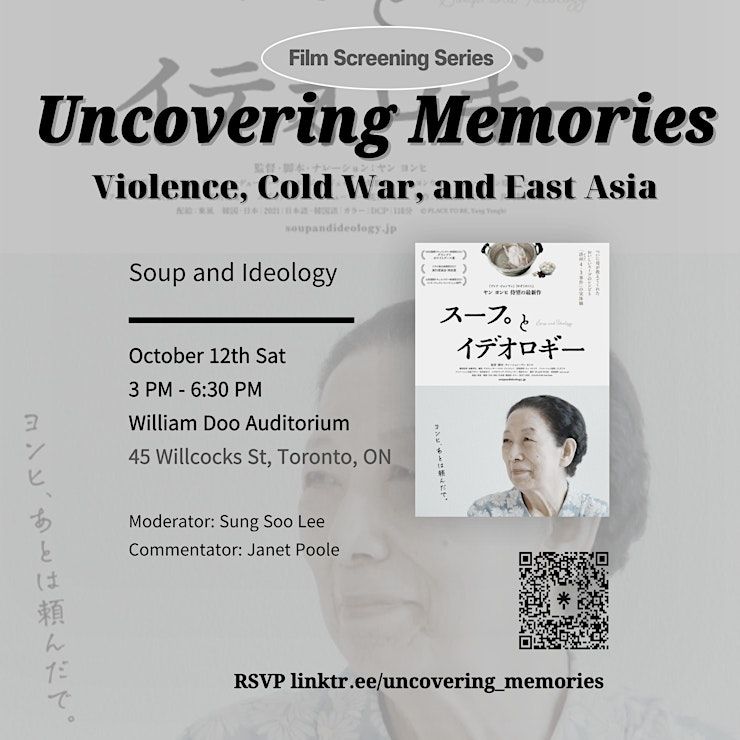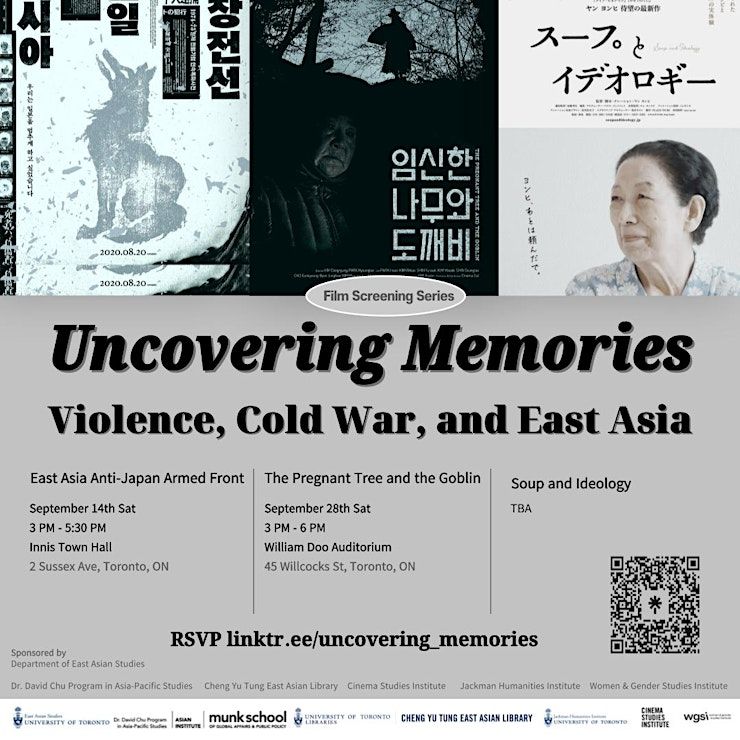Soup and Ideology
Schedule
Sat Oct 12 2024 at 03:00 pm to 06:30 pm
Location
William Doo Auditorium | Toronto, ON

About this Event

Program
2:30 Venue open for audience
3:00 - 3:05 Greetings and introduction
3:05 - 5:05 Screening
5:05 - 5:20 Break
5:20 - 6:20 Conversation with Professor Janet Poole
SYNOPSIS
Tracing back mother’s very last memory, we finally become a family.
On one fine day in Osaka, Yong-hi invites her Japanese fiancé to her mother's house. When her father was alive, he never allowed her to meet a Japanese man, but her mother happily prepares the traditional chicken soup that’s only served to sons-in-law in Korea. Though shocked by the photos of KIM IL-SUNG on the wall, her fiancé says, “our ideologies are different but let’s enjoy the soup”. And now as a husband, he stands by them when the mother gets Alzheimer’s disease after confessing her old-time buried hometown secret that the daughter never knew; Jeju uprising.
DIRECTOR INFO
Biography
YANG Yong-hi was born in Osaka, Japan as a second-generation Korean resident known as “Zainichi.” After she graduated from Korea University in Tokyo, she had worked as a teacher, theater actress and radio host. Since 1995, she started to work for TV documentaries and news programs about Thailand, Bangladesh, China and other Asian countries. Beginning in 1997, she spent six years in New York and obtained Master of Arts in Media Studies in New School University. After returning to Japan in 2003, she directed a documentary film Dear Pyongyang (2005) and won The Special Jury Award in Sandance Film Festival 2006 and The NETPAC Award in Berlin Film Festival 2006. She released her second documentary Sona, the Other Myself (2009) and her first narrative film Our Homeland (2012). Our Homeland won CICAE Art Cinema Award in Berlin Film Festival 2012 and awarded many major prizes in Japan. She published three non-fiction books about her family stories and a novel <朝鮮大学校物語>in Japan. In South Korea, <가족의 나라 OUR HOMELAND> was published in 2012.
Filmography
Dear Pyongyang, 2005
Goodbye, Pyongyang, 2009
Our Homeland, 2012
(http://mline-distribution.com/sub/film_010100.html?bmain=view&mode=&uid=403)
----------------------------------------
The event organizer's introduction:
Soup and Ideology explores the history and forgotten memories of the April Third Incident in 1947, a tragic event in which the South Korean government carried out a genocide during a period of intense confrontation with the North. When the resistance movement emerged on Jeju, a remote southern island, the government responded with an indiscriminate massacre of the islanders. The film's central figure, Kang Jeong-hee, is a survivor of that massacre. Born in Japan, Kang returned to her hometown of Jeju after Korea's liberation. However, the brutal April Third Incident forced her to move back to Japan, where she became part of the "Zainichi" community, the Korean diaspora in Japan. Amidst the severe Cold War tensions, this diaspora community faced intense ideological pressures, being forced to choose allegiance between the South and the North. As a Zainichi woman activist, Kang played a role in the Repatriation Movement, which encouraged the relocation of Zainichi Koreans to North Korea from the late 1950s to the mid-1980s. The film, directed by Kang’s daughter, follows her journey of understanding her mother's stubborn resistance to South Korea and her support for North Korea, which even led her to send all her sons there. Soup and Ideology illustrates how vast political forces, such as Cold War dynamics, can deeply impact personal lives, as seen through Kang’s story. The memory of state violence and genocide irrevocably shaped the course of her life and that of her family.
Sponsors
Department of East Asian Studies, University of Toronto
Dr. David Chu Program in Asia Pacific Studies, University of Toronto
Cheng Yu Tung East Asia Library, University of Toronto
Cinema Studies Institute, University of Toronto
Jackman Humanities Institute, University of Toronto

About this series...
Uncovering Memories: Violence, Cold War, and East Asia
This film screening series presents three films that explore experiences and memories related to violence, imperialism, and the Cold War in East Asia.
By critically examining the Japanese armed group's resistance against neo-imperialism (), the unrecorded memories of women in U.S. camptowns in South Korea (), and the herstory of the April Third Incident that spans Japan, South Korea, and North Korea (), these films delve into the enduring impacts of state violence and socio-cultural trauma. These discussions are essential not only for understanding the past but also for addressing its ongoing resonance in contemporary society.
Where is it happening?
William Doo Auditorium, 45 Willcocks Street, Toronto, CanadaEvent Location & Nearby Stays:
CAD 0.00
